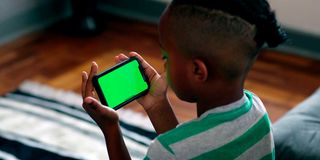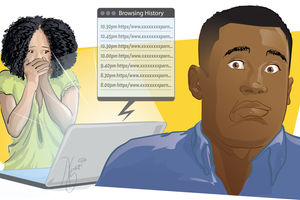
As uncomfortable and embarrassing as it may be for both parents and children, experts say, part of raising a child today means explaining the impact on pornography.
When Risper Kigen, an assistant chief in Nairobi’s Umoja 1, walked into a PlayStation shop in the low-income estate, nothing could have prepared her for the scene that greeted her: nearly 30 children, some as young as eight, huddled around a screen watching pornography. Others sat in corners, visibly intoxicated, the smell of marijuana thick in the cramped room.
“I was very shocked. There were about 30 children between the ages of eight and 16 watching dirty content, some smoking bhang. These [shop] are supposed to be safe spaces, [where children and adults pay about Sh30 for five minutes to play on Playstation consoles to keep them busy] yet here were minors, completely unsupervised, being destroyed right under our noses,” she told Nation Lifestyle.
According to Ms Kigen, this is not an isolated case. Over the past few months, she has shut down multiple “youth dens” disguised as gaming hubs or informal hangout spots in the neighborhood, where children are losing their innocence. The problem is not only in Nairobi; in tens of rural areas, these gaming shops are mushrooming, some exposing minors to sexually explicit content.
The rise in online pornography consumption among children, Ms Kigen says, is being fuelled by a dangerous mix of parental absence, cheap smartphones, Wi-Fi access, and minimal supervision by domestic caregivers.
“Parents are doing very little; most parents are away working. They leave their children at home with house helps who do little more than keep the children fed and alive. But in terms of monitoring what they are doing online, or where they sneak off to, it’s a free-for-all,” she said.
These children are lured through peer influence or curiosity. With smartphones in hand and internet access within reach, today’s children are no longer sneaking peeks at old magazines. Instead, they are exposed to a boundless digital library of pornography, including disturbing content like mock sexual violence, misogynistic material, and even child exploitation.
On platforms like TikTok, Facebook, X, Instagram and YouTube, provocative dance challenges and sexually suggestive performances by influencers dominate their screens. In extreme cases, access to late-night erotic performances like ‘kunyonga’, on TikTok, which have become the talk of the town.

On platforms like TikTok, Facebook, X, Instagram and YouTube, provocative dance challenges and sexually suggestive performances by influencers dominate children screens.
“It’s heartbreaking. These children get lost even before they’re mature to understand what they’re getting into. We’ll end up raising a generation that is hypersexualised, exposed to dangers we may not reverse, and emotionally detached,” she warns.
A new parenting crisis
But as many grapple with parenting in an era of online pornography, child psychologists say these parents are unaware of how much damage unsupervised access to online content is causing.
The result? A generation exposed too early to sexually explicit content, curiosity-fueled experimentation, and emotional damage that parents are either unaware of — or too ashamed to confront.
“You cannot outsource parenting. We must re-evaluate our priorities,” Ms Kigen says.
Counselor and psychologist Loice Noo-Okello agrees. She explains that even seemingly harmless content—such as short dance clips—can carry powerful psychological triggers that the young mind is not equipped to process. The photos or videos stimulate curiosity and imprint on the brain in ways that shape future behaviour, potentially creating a society of sexual deviants.
“The brain captures this content in a very magnetic way. Once a child sees a provocative video or image, it replays in their mind constantly. They want to go back to it, to feel that excitement again, and it becomes an addiction,” she said.

As uncomfortable and embarrassing as it may be for both parents and children, experts say, part of raising a child today means explaining the impact on pornography.
Ms Noo says she has seen children in therapy who isolate themselves, withdraw from physical play, and lock themselves in their rooms late at night—often watching pornography while parents assume they are asleep.
“They no longer want to play outside. They lock themselves in rooms, consumed by what they’re watching in secret. Yet parents assume they’re asleep — they’re not. They’re watching,” she said.
And the effects of this exposure are not just digital — they manifest in real life.
“We are seeing teenagers getting pregnant, not by older men, but by their fellow teens, these are 15-year-olds getting 16-year-olds pregnant. Why? Because they’re imitating what they’ve seen.
Their minds aren’t ready for the psychological weight of sex—but their curiosity pushes them into it,” she said.
Although gadgets are essential for learning, Ms Noo says, “as soon as you hand your child a smartphone without supervision, you’re handing over their childhood to the internet,” she warns.
“Even with restrictions, these children know how to bypass them. They’re smarter than we think.”
The biggest tragedy, experts say, is the silence that surrounds children’s digital lives. Many children are left to navigate these digital worlds without guidance, without questions, and without a safe space to talk.
“Parents aren’t talking to their children. They don’t ask what they’re watching, who they follow, or what content they engage with. There is no communication. There is no relationship,” she said.
Explain dangers
As uncomfortable and embarrassing as it may be for both parents and children, experts say, part of raising a child today means explaining the impact of pornography.
“But parents are embarrassed. They come to us only when things have spiraled — when their child is addicted to porn, or masturbating excessively, or has already engaged in risky sex. But why wait that long? If you can afford a phone, you can afford to be present,” Ms Noo says.
Cleopa Njiru, another psychologist has also seen the damage in his sessions with children and teens. He explains that early exposure—sometimes starting with seemingly innocent cartoons, but with sexual undertones—which alters a child’s brain development.
Then, the teenagers with active hormones will get together with their friends and, when parents are out of sight, seek out and explore dark and salacious imagery.
“At the age of one, two, or three, a child’s brain is in a rapid stage of development.It absorbs everything. When a child is repeatedly exposed to sexualised images, sounds, or behaviour, especially through videos and cartoons, their brain starts to normalise that. It becomes part of their thinking patterns,” he says.
Also Read: How internet porn is destroying our children
Mr Njiru explained that most of this content is accessed through smartphones, often handed to children to keep them entertained or be quiet.
“Many parents are unaware of what their children are watching. A simple cartoon video can lead to a chain of suggested content, and before you know it, the child is watching half-naked dancers or hearing explicit lyrics. It’s subtle but dangerous,” he said.
Mr Njiru warns that dopamine—the brain’s “feel-good” chemical—is released when children watch explicit content, making it addictive. Some of his young clients, he says, are as young as ten and already struggling with dependency.
“This addiction is just like alcohol or drugs,” he says. “I’ve counselled children who say they can’t stop watching porn—even during school hours.”
He adds that because the brain is still developing, what it receives repeatedly becomes part of a child’s internal processing.
“So even when they become adults, their mind is still preoccupied with sex,” he says.
The consequences spill over into real life: behavioural issues, poor academic performance, and early experimentation with sex. Children become more obsessed with their online lives than with real-world connections, often missing out on quality time with family or friends.
“They get too involved in what's happening online, whether it's watching inappropriate content or checking the latest trends, rather than focusing on their studies," he explains.
Is internet the enemy?
Mr Njiru stresses that parents must become active participants in their children’s digital lives.

The internet is not the enemy. But left unguarded, it can become the thief of innocence.
“When parents notice changes in behaviour—mood swings, isolation, defiance—they must dig deeper. Don’t wait until it’s too late. Seek professional help early,” he says, “These children might start practicing what they see online with their peers.”
Ultimately, the expert agrees: the internet is not the enemy. But left unguarded, it can become the thief of innocence.
"It's not about condemning the internet or social media, it's about teaching children how to use these platforms wisely and productively," he explains.
He also notes that children from homes experiencing separation, divorce, or emotional instability are particularly vulnerable. These children often seek solace online, falling into dangerous digital rabbit holes.
“Parents must step in—not just with rules, but with attention, presence, and understanding. Therapy, sports, bonding time—these are the antidotes,” he says.












